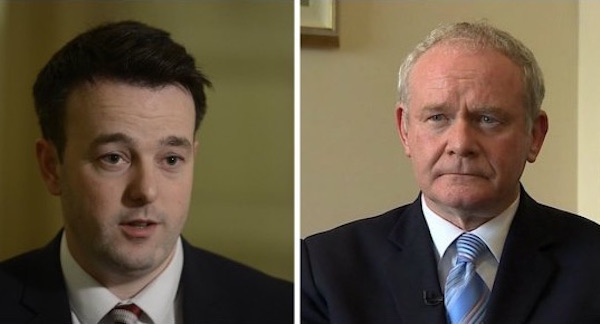
Nationalist politicians in the north of Ireland have expressed concern over voter apathy ahead of next week’s election to the Belfast Assembly.
“The great danger is that turnout continues to fall, that people don’t feel that their vote on May 5 is important,” SDLP leader Colum Eastwood said this week.
There are 108 seats on offer in Thursday’s election, with most of the political interest centred on whether Sinn Fein can overtake the hardline unionist DUP to become the largest party in the chamber.
Political deadlock has been the norm over the past five years, with the British government operating the key levers of power from a distance by means of budgetary threats to the block grant or through the mechanism of ‘national security’.
Under the North’s system of power-sharing, there is no requirement on politicians to form a government, as all of the main elected parties are automatically offered Ministerial posts. The d’Hondt system for sharing out positions means that status and salaries are divvied up without any need for explicit agreement.
Despite public anger over the recent budget-slashing ‘Fresh Start’ deal agreed by Sinn Fein and the DUP with the British government, the nationalist SDLP and the unionist UUP are certain to place third and fourth. Republican ‘dissidents’ remain disorganised and have made no attempt to impact the election, while the small left-wing People before Profit and independent candidates are too small to have any affect. As a result, voters will inevitably see the same faces returned.
Colum Eastwood claims that this ‘boring’ system is the price of peace. “We are all grateful for the peace but we can’t be expected to stay forever grateful. Otherwise our politics will stay forever bored,” he says. “This election is a chance to break free from the boredom. It is a chance to endorse credible and progressive policies”.
In his campaign, Sinn Fein’s Martin McGuinness has emphasised the benefits of an “agreed Ireland” and urged voters to return him to the post of Deputy First Minister.
The party’s manifesto, issued on Wednesday, defended the work of the executive over the past five years, including the much-criticised office he shares with DUP leader Arlene Foster.
The party is running a total of 39 candidates across the north’s 18 constituencies and is targeting the Foyle constituency in Mr McGuinness’s hometown of Derry, where the SDLP continues to outpoll Sinn Fein.
In this election, Sinn Fein has promised to create 50,000 new jobs and increase health spending. Mr McGuinness also expressed optimism that the impasse over new mechanisms to address the legacy of state killings and collusion could be resolved in the near future.
“I would have preferred that solution to have been found before the election but for some reason the British government didn’t want to go ahead with it before the election,” Mr McGuinness claimed. “But I believe it will be addressed immediately after the election and I do hope that a solution will be found.”
Two independents who are being supported by local republicans are Dr Anne McCloskey in Foyle and Martin McAllister in Newry and Armagh, while the left-wing People before Profit are hoping for their first Assembly representation and have their sights on two seats, Eamonn McCann in Foyle and Gerry Carroll in West Belfast.
POLITICS VS PROTEST
There have been some signs at this year’s Easter commemorations that Sinn Fein’s republican rivals are beginning to recognise a need to “organise politically”.
During the ‘Unfinished Revolution’ Easter Rising commemoration in Coalisland, County Tyrone, on Easter Sunday, former republican prisoner David Jordan spoke about the need for a new “political vehicle” to be established.
A commemorative event organised by the Dublin branch of the Irish Republican Prisoners Welfare Association, which represents republican political prisoners at Maghaberry, was addressed by prominent County Tyrone republican Packy Carty along similar lines.
He said that opportunities have “existed to tie numerous social issues into the big picture of national sovereignty, but without a political movement with a strategy, we have had to watch from the sidelines”.
“It is of the utmost importance comrades that we organise politically, that the mass protest movements be joined and our analysis is heard,” he said. “The lesson from Catalonia is when you teach the people to see that their social problems stem from the lack of national sovereignty, then the sky’s the limit in terms of the movement that can be built.”
Mr Carty described partition as “the greatest evil of our time” and said it “continues to deny the Irish people their right to national sovereignty and self determination and while it continues, a nation built on the ideals of the 1916 Proclamation can not be realised”.
“The 26 County southern state is as much a British creation as the six county Northern statelet,” he said. “Britain continues to fear an independent socialist Irish Republic and so without mandate in Ireland, enforces partition on us. To realise our ideals and objectives it will be necessary to uproot both failed states along the way.”
![[Irish Republican News]](https://republican-news.org/graphics/title_gifs/rn.gif)
![[Irish Republican News]](https://republican-news.org/graphics/title_gifs/harp.gif)

